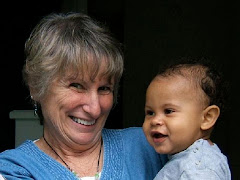Wednesday, November 17, 2010
Oxytocin Hits the Mainstream
Oxytocin, a hormone known for years to be released in a woman while breast feeding is now being touted in the popular press. Susan Kuchinskas wrote a book in 2009 called "The Chemistry of Connection" and in the book she talks about Oxytocin. Bryan Post(www.postinstitute.com) has been speaking of it for the past couple of years as perhaps the "single most important discovery" for those of us who work with families in the areas of attachment and trauma. In the most recent issue of More Magazine under the section called Best Health Advice of 2010,#9 is entitled: "Stressed? Call Mom". "Simply talking to someone who makes you feel loved releases the bonding hormone oxytocin, which in turn lowers the stress hormone cortisol, according to research conducted at the University of Wisconsin at Madison". Author of the study, and director of the Child Emotion Lab at the university goes on to say that his research indicates that a simple hug or phone call from their moms could soothe a group of jittery girls. The same lessons apply when we're under stress. Our primary caregivers are our source of comfort when we're young, but as we get older, we develop close attachments with partners and friends. After a hard day, the best thing to do is pick up the phone. Just making that contact with someone who makes you feel loved" (and I would add cared about and listened to)"may relax you, if you're very stressed."
Subscribe to:
Post Comments (Atom)



Hello, what are your suggestions on how to handle our child's fears when he comes to us. He has been several foster care homes; however, he has been with us for almost 2 years (he is our nephew), and we are adopting him. Some of his individual fears are: 1) fear of caseworker visits; 2) fear of being taken away; 3) fear of non-acceptance; 4) fear of failure; 5) fear of not getting his way...etc.
ReplyDeleteHow do you recommend handling a child who has taken on the habit of lying.
ReplyDeleteI have several suggestions for you and please know that your nephews fears are very real to him because of his past experiences. He has been removed from various caretakers, caseworkers have been involved in those removals and perhaps even the police, if he had been accepted and had experienced unconditional love, he wouldn't be anxious all the time about being accepted. He most likely feels like a failure because in his life, not much has worked for him in spite of how hard he was trying. Your son has to have his way because he has to take control whenever he possibly can. And now for interventions: listen to his fears; when he tells you that he is dumb or worthless or bad ask him to tell you about it, to tell you what he is thinking when he says that. Don't try to talk him out of it in the moment...LISTEN. And then say "wow, that must feel awful. Let me tell you how I see you..." and then you talk and tell him the things you know he is good at, how helpful he is, how loving he can be, how smart he is. Tell him that he is safe; no one is going to take him away. And even though you might sometimes be angry, you love him and you are so glad he is your little boy. When he is wrestling you for control, let him know that you know he feels like he has to do these things, but that he is a child and you as the adults will decide what is best and this is what parents do for children. Acknowledge that he probably had way too much independence (use his little words of course) when he was smaller, but he really needed a mommy and daddy who would decide when and what he ate and when, and where he slept.
ReplyDeleteThanks for the question, hope this helps.
LYING: My prescription for lying is quite simple but not particularly easy. First of all it is important to know for certain that a child has lied. And then you will ignore the lie, but don't ignore your child. He is in a state of dysregulation, i.e. stress...his normal thought processes are confused and his short term memory is suppressed. He will not be able to reason and if you try to talk to him in that moment he will most likely tell another lie because you are adding to the stress. Instead, give him a hug, tell him you love him and you aren't going anywhere. Reassure that it is going to be okay. After you've done this try to deal with your own stress by doing whatever calms you down and then later after you are both regulated...let him know that it really hurts you when he tells you a lie. If you then insist on the truth, you will probably just get another lie. He gets the message.
ReplyDelete